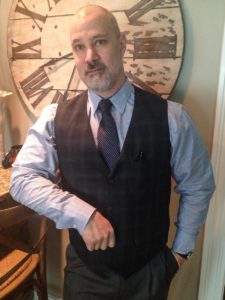
Have you ever wondered about the life of the crew that makes big concerts a real triumph? Want the real scoop on what it takes to “make it” in the industry? With festival season upon us, we were curious to know what truly makes shows so spectacular. We sat down with tour manager and fellow bro, Clay Hutson, to get his take on the world behind the stage.
A Busy Man
If you track through the last few decades of popular music, you’ll see lots of bands, singers, songwriters, producers and others, but you’ll also discover that when it comes to creating dazzling live shows and high quality sound recordings, the big stars need lots of help from qualified professionals. And one qualified professional whose name repeatedly comes up as a key player in the world of contemporary pop music is Clay Hutson.
The name is probably not as familiar to you as the day’s biggest pop stars. But trust me, if you know the work of Prince, Guns N’ Roses, Pink, Kid Rock and Garbage, you know the work of Clay Hutson.
A Thankless Job
Before we get into the specifics of Hutson’s career and the impact he’s had on the music industry, let’s get a clear understanding of what his various jobs have involved.
Hutson got his start as a sound engineer for various music artists in the studio as well as in live settings. What does a sound engineer do? The job mostly involves a technical mastery of the equipment used to record the music and vocals. And ‘mastery’ is exactly the word to describe Hutson’s familiarity of the tools his trade after many years in the business.
Yet, Another Thankless Job
If being a sound engineer is a difficult job to execute on a regular basis, being a tour manager is basically like several difficult jobs to execute. The best way to understand the challenges inherent in the job is to get a sense of what a typical day for him as tour manager is like.
Beginning each day before 7 am, Hutson makes it clear that he is usually the first person to arrive at a performance venue. “I begin by exploring the building, reviewing my schedule and developing a daily list of tasks. Next, I figure out how to store the equipment and materials.”
The next step is to have his staff plan ahead by “setting up decorations and gear in a way that hastens the band’s departure.”
So what happens during the actual performance? Does Clay and his crew take a break by sitting back and having a cigarette while the show is going on? Hardly.
“During a concert, I plan for the end of the show. I tell each crew member what to do when it’s time to go. This improves efficiency by making it possible for us to start removing equipment as soon as the event ends.”
As you might imagine, the workload doesn’t end there. It’s simply on to the next city, and eventually, the next tour. Chances are, you’ve never taken the time to consider how much work is involved.
This is not the job for someone not blessed with an ability to handle multiple tasks as well as a strong eye for checking over their work. If you have any doubt about Clay Hutson’s tendencies, check out what he has to say about his work habits:
“I repeatedly check my work for mistakes that could compromise safety or degrade the quality of a show. A serious error might damage my reputation for the rest of my life. I always fully prepare for each event and strive to organize equipment in a sensible way.”
Hutson understands what’s at stake during the entire project. That’s why he says, “Thorough planning helps me manage the crew while boosting productivity and efficiency.” So that’s why he pushes himself so hard. “As I travel to a concert venue on a bus or airplane, I list every task that we need to perform. I always try to include everything. Some minor chores don’t seem particularly important, but significant problems can occur if people overlook them. I also picture the venue in my mind and envision upcoming projects.”
Because so much is at stake, he also must push his staff very hard. This means surrounding himself by the very best. How does he get a strong sense of who the very best is? The answer to that question may surprise you.
Hutson makes it clear that when it comes to hiring a staff, a person’s abilities matter a great deal more than their disposition. In other words, he doesn’t get fooled by a friendly face. “Many people seem to believe that a staff member’s attitude matters more than the person’s abilities. On the other hand, I think skill ought to hold the most importance. It’s often impossible to fully train a likable but untalented worker.”
So if being likeable isn’t the key, what does matter? “Genuine talent normally develops out of a passionate interest in a person’s career. Well-suited people frequently feel a strong motivation to learn and perfect the necessary skills on their own. I prefer to collaborate with these individuals, even if some of them are jaded or cantankerous. Cheerful, courteous employees tend to have successful careers. Unfortunately, some use their personalities to compensate for a lack of competence.”
Where It All Began for Clay Hutson

Let’s now take a l closer look at Clay Hutson’s background. As a child he had an early interest in music and studied theater design at Central Michigan University, graduating with a bachelor’s degree. His next step of development was getting a master’s degree in business administration from the Stephen M. Ross School of Business.
A gig with noted evangelist Billy Graham gave him early exposure that came in very handy for later work. From there, he worked with a number of major artists as sound engineer, tour manager and as an entrepreneurial developer of new equipment.
But what are the underlying philosophies of Clay’s work ethic that drive him? For that we’ll have to take a closer look.
Clay Hutson’s Philosophy
When asked a book he would personally recommend to anyone for professional advice, he mentions Don’t Sweat the Small Stuff by Richard Carlson. If this seems a surprising choice from a man whose career involves a great deal of sweating of small stuff, listen to his reasons for praising this book and finding it helpful.
“The book makes you look at life more objectively, and it helps you both professionally and personally. While most books teach you to pay attention to small details, this book tells you not to worry about them as much. In their personal and professional lives, people often focus too much on those small details. If you do that, you miss important bigger details or lose sight of your objective while you perpetually obsess over a small problem. This book teaches you to look at the big picture and to keep it as your focus.”
It’s easy to see how somebody in Clay Hutson’s line of work would fall into the all-too-common trap of worrying a great deal about the small details. After all, his daily tasks involve supervising the rigging, the packing and unpacking of equipment, not to mention overseeing the sound and visual quality of the performance. So how does he avoid this trap? What is the key to his ability to keeping is big picture goals in proper perspective. Once again he cites Don’t Sweat the Small Stuff as a helpful tool for achieving this.
“When you look at the big picture, your perspective is clearer. The book gives you a balanced way to reach your goals and a strategy to make important steps fall into place. Also, the book helps you learn how to keep your composure in stressful situations.”
When asked to mention a second book that he found helpful to his philosophy, Hutson cites yet another surprising example. He does not talk about a book that taught him the basics of sound design or tour management. Instead, the other book he mentions is Think and Grow Rich a book widely admired among aspiring entrepreneurs. He mentions that the famous Napoleon Hill book has helped thousands of people, but helpfully adds, “It makes you develop a winner’s mindset, find purpose in your life and develop actionable plans to reach your goals.”
But the vast array of influences on Clay Hutson’s philosophy and work mindset doesn’t end there. Hutson says, “I occasionally write down quotes that inspire me. When I need motivation or guidance, I take the time to reread them. A few of my favorite sayings come from Thomas Jefferson and Vince Lombardi. I also appreciate an amusing quote from W.C. Fields about persistence and knowing when to give up on a plan that doesn’t work.”
What’s next?
It’s safe to say that someone with the strong background and work ethic of Clay Hutson will never struggle to find work. His most recent undertaking is perhaps his most ambitious. It is
The ability of Clay Hutson and his crew to tackle such a wide range of touring artists is made possible by his use of the best possible equipment. In order to understand how Clay came across such equipment, we first have to explore a vital step in his development – his transition from manager to entrepreneur.
Lessons from the past
After a lengthy period of time of being very involved in a wide range of aspects of sound engineering, tour management and a number of other areas of the musical field, Clay made a very important decision in the evolution of his career: he used his vast experience to create a company that would expand on his mission. In no time at all, his brand new business was formed. “Fortunately, I learned valuable skills and lessons in each of my past positions.”
Clay had picked up a great deal of experience with the company he’d previously worked for. But since financial issues out of his control (“the Big Recession”) it was time to move on. He says, “With my acquired skills and the need to distance myself from a struggling company, I made the very difficult decision to leave my job and start my own business. At that point, I just knew I was ready to set out on my own. I took a leap of faith, and I landed on my feet.”
Since then, the next phase in Clay Hutson’s career – the entrepreneurial stage – has taken place. There has been no looking back from there.
Three-Ring-Circus
Clay Hutson’s most recent production has possibly been his biggest challenge. Accompanied by a three-ring circus of controversy, hype and spectacle, the American Tour of Kid Rock has been made possible by Clay.
Perhaps the most impressive aspect of Clay Hutson’s involvement in the tour has been his ability to ignore the multitude of distractions about to simply go about the business of getting his work done. As usual, Hutson has done an admirable job.
If anyone doubts whether or not Hutson is ready to meet the many challenges of a gigantic stage show, the stage manager’s own words from a recent interview should forever remove those doubts. When asked about the latest technological advances for larger-than-life arena shows, Hutson doesn’t sound intimidated at all. Instead he is excited by the new possibilities.
“The industry is constantly cutting-edge. If you sit back on your heels for too long, you’ll quickly become obsolete. Already three versions of a product behind. The size and power of moving lights have gotten to be incredible. They weigh less than they used to, allowing them to become more mobile.”
When it comes to making the most of a rock and roll spectacle Hutson is all for it, expressing a fondness for musical performers who throw themselves completely into the performance. “I especially enjoy artists like Pink, and Lady Gaga, who incorporate a lot of acrobatics, and aerial stunts, into their routines. It’s great to see artists push their art, and it’s not just about the music, it’s also about the art form, and how they express themselves.”
It’s not clear how much of Hutson’s words here are a specific reflection on his recent work on Kid Rock’s American Rock and Roll Tour, but anyone eager to find out what Clay Hutson has been up to lately will have plenty of opportunities to find out. The American Rock and Roll Tour is scheduled to roll on through August.
Clay’s Advice for Others
When it comes to offering wise words to anyone seeking to follow in his footsteps by pursuing a career in the music industry, Clay Hutson is very clear in establishing the need to have a very comprehensive understanding of how everything in the business works. It would be very helpful to recall that in his own career. He’s had a wide range of experience would later come in handy toward paving the way to the success he currently enjoys.
This begs the all-important question; What does Hutson consider his favorite aspect of what he does? His answer, as you may suspect, is complex: “I have several favorite things. I like the variety of tasks and new experiences. I have worked with several big names in the music industry, and I have been thankful for each unique opportunity. I learn new things as I face new experiences, and learning helps me grow. I enjoy working with my crew and clients and seeing our ideas come to life. Planning any large-scale live event requires hard work from multiple people. When we all work together as a team and share a common goal, we appreciate the positive outcome much more.”
Another important issue for Clay to consider the question of what he thinks of the recent trends in music performance as well as the trends in successful artists themselves.
“As I am involved in a “spectacle” type of industry, wowing clients is always the goal. Thus, I am truly excited about the technological advancements that keep popping up within the live music genre. The industry is constantly cutting-edge. If you sit back on your heels for too long, you’ll quickly become obsolete. Already three versions of a product behind. The size and power of moving lights have gotten to be incredible. They weigh less than they used to, allowing them to become more mobile. Everyone focuses on video, and I think that’s a dead horse, but that’s something that is on every tour. The video walls are getting bigger, and the screens are getting bigger, and there is more pixel density. Those huge video screens are great, but that is actually a trend that I hope runs its’ course sooner rather than later. We learn to wow audiences without having to just rely on projecting an image onto a surface. I especially enjoy artists like Pink, and Lady Gaga. They incorporate a lot of acrobatics, and aerial stunts, into their routines. It’s great to see artists push their art. It’s not just about the music, it’s also about the art form, and how they express themselves.”
You can read up more on Clay Hutson in our previous post: https://thebrotalk.com/brofidential/bro-qa-clayton-hutson-reveals-secrets-music-industry-success/
Follow him on Facebook, @Clayhutson1, and LinkedIn














Leave a Reply
Be the First to Comment!
You must be logged in to post a comment.
You must be logged in to post a comment.